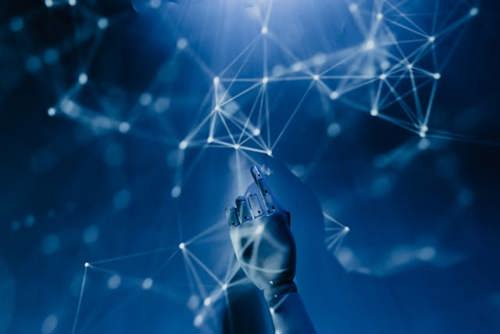
Despite what the more attention-grabbing headlines might say, artificial intelligence – true artificial intelligence that is able to think independently and seems to possess a consciousness – is likely to be some way off from becoming a reality.
That doesn’t mean that today’s artificial intelligence (and tomorrow, for that matter) doesn’t present a potential threat to your career development though.
In this blog, we delve a bit deeper into the topic of generative AI and its potential impact on the world of work, and specifically, HR. Carry on reading if you want to find out how to futureproof your career!
There’s a difference between the AI of popular culture and generative AI. That difference has been increasingly muddled by sensationalist media reports proclaiming that artificial intelligence is here and that it’s only a matter of time before artificial intelligence rules the world, Terminator-style.
When we think of artificial intelligence, we’re likely to draw upon representations of it in our culture and society, like books, films and art. These representations ultimately colour our perception of the technology, its influence and its potential effects.
It’s clear that the debate about the merits and the drawbacks of artificial intelligence can easily fall into generalisations and polarisation. In these debates, where opposing viewpoints face off, artificial intelligence either takes the form of the benevolent droids of Star Wars, like R2D2 or C3PO, faithfully carrying out humanity’s every wish, or the terrifying Cylons from Battlestar Galactica, rising up against their human masters and overthrowing them.
Contemporary debate about AI and its potential impact on society reflects this polarisation too. Either artificial intelligence is the greatest leap forward ever known to humanity, capable of bringing untold liberation and freedom; or it’s the worst development since the atom bomb, capable of bringing unimaginable destruction.
An article by George Siemens in The Conversation is really informative when it comes to exploring whether the type of artificial intelligence that we think we currently have matches up to what we really have in reality.
As Siemens explains, artificial intelligence can generally be divided into two distinct types – and we only have one at the moment:
A weak form of artificial intelligence that is focused on completing one specific, ‘narrow’ task. It uses computer prediction, algorithms and machine-learning to mimic the way that humans complete a single, given task. It isn’t able to think independently or complete tasks besides that it was originally designed for. It doesn’t have consciousness and doesn’t possess sentience.
Artificial intelligence that possesses human-like intelligence and the ability to act and learn independently. It might also have sentience and a consciousness. It is able to apply its intelligence to any task, rather than just one specific thing. It has intelligence equal to, or greater than, a human’s.
At the moment, a lot of people are confusing narrow intelligence AI chatbot models like ChatGPT, Gemini (formerly Bard) and DeepAI for general intelligence models. In truth, we’re a long way off from seeing general intelligence AI models existing.
The type of artificial intelligence that is making great strides in development at the moment is narrow artificial intelligence – the type that is essentially an incredibly complex predicting machine. As a result, the type of effects that it’s likely to have on society will likely be less dramatic than the AI nirvana, or AI apocalypse that many commentators have been predicting.
That said, it’s likely that even narrow AI will cause significant disruption, upheaval and change when it comes to the world of work that we’re used to.

There’s no sugar-coating the fact that, yes, AI will likely make a huge number of jobs obsolete.
Historically, when technology has replaced jobs it has specifically been blue-collar roles that have been mainly at risk of replacement. Think of jobs that are generally manual and that involve repetitive tasks and actions, like factory and assembly line workers, for instance.
With the development of narrow AI models, a clear threat to white-collar roles is emerging for the first time: those jobs based in offices. Office-based clerical roles, like admin and finance, marketing and IT and… gulp.. human resources are all at serious at risk of replacement if AI is adopted widely in workplaces around the world.
So, what specific jobs are at risk of being consigned to the scrapheap?
Research and real-world studies suggest that the jobs most likely to be replaced in the short-term by AI are those in a broad range of predominantly office-based roles.
A 2023 report by Goldman Sachs raised the alarming prospect that up to 300 million jobs around the world could face becoming obsolete if generative AI continues to be widely adopted. The report cited a number of jobs that could potentially be at risk of being replaced by AI going forward. According to the study, they were:
Basically, most traditional white-collar jobs could be potentially impacted by generative AI in some capacity. Of course, that doesn’t necessarily mean that AI might take your whole job but it does mean that some aspect of it might be taken. For example, if you work in technology as a software coder, generative AI might play more of a role in doing the more repetitive aspects of your role for you. Of course, there are no specific guarantees about whether your role is safe or not. The most we can do is predict and wait to see what happens.
Many scientists, academics and commentators suggest that, whilst some jobs may be replaced by artificial intelligence, a lot of new jobs will be created by it. They cite the boom in some types of roles that usually appears when a new form of technology gets adopted wholesale by society. For example, the weaving machines that put hundreds of thousands of handweavers out of work in the 18th century required a few skilled workers to operate and maintain them. New roles were also created in other areas of the supply chain, to reflect the increase in productivity and the need to finish and distribute products faster than ever before.
Whilst that’s great, the problem is that a new technology rarely creates more jobs than those that it previously replaced. As a result, social upheaval is often inevitable when it comes to the effects of new technology on the economy.

The world of work is ultimately a social one. It’s based on human interaction and the human brain is wired to prefer communication with other humans. We’re a social species after all, and we ultimately evolved by working together. This means that it’s unlikely that technology – no matter how fantastical it is – will ever truly replace the simple, but incredibly powerful phenomenon of human communication.
If you’re still worried though (and it’s good to be prepared) here are a few steps you can make to futureproof your career and help it withstand any AI shocks.
Continuous learning is probably one of the most effective ways that you can protect your career. After all, if technology is developing, gaining new skills and abilities, then that means that you’ll need to develop your skills too. AI is one of those areas.
Professional qualifications are usually developed and offered by professional membership associations. They’re often a required qualification in particular roles. These are industry bodies that are responsible for maintaining quality, standards and professionalism in particular fields. When it comes to the world of human resources, the CIPD – the Chartered Institute of Personnel and Development – is one of the most respected HR professional membership bodies, having around 160,000 members worldwide.
The CIPD offers a range of professional qualifications that you can use to deepen your skillset and widen your expertise. They’re designed to appeal to professionals at all levels of their career: from starting out in the industry (CIPD Level 3 Foundation Certificate in People Practice), to those looking to gain a more intermediate HR position (CIPD Level 5 Associate Diploma in People Management) to those who want to progress to the most senior levels (CIPD Level 7 Advanced Diploma in Strategic People Management). Developing your skills will really help to cement your professional expertise and
One strategy to protect your job in the face of an all-powerful AI is to adapt some of its own tactics and strengths. For instance, generative AI is exceptionally skilled at one specific task. You can meet this threat by developing your own specialist knowledge of a particular area.
Deepening your understanding of one specialist area of human resources can really help to cement your position and make your future career much more stable. By becoming an expert in your field, building years of expertise and experience, you’ll be able to distinguish yourself from an algorithm.
This article by the Big Think explores some of the areas where AI can’t match a person. The results are quite surprising. Authors Kai-Fu Lee and Chen Qiufan argue that current artificial intelligence is incapable of three particular things: creativity (true originality), empathy and dexterity.
Luckily, a large part of HR is focused on people – it’s called the People Profession for a reason! – and these skills are particularly needed when it comes to working with others. Think about those areas where you particularly shine at work and develop them.
AI systems gain a large part of their power from the informational network that they’re able to draw on in the form of the internet. As a HR professional, you too can leverage the power of networks to improve your career development.
By building a professional network, you could be able to:
This blog on Forbes by Expert Panel runs through some of the most effective ways that you can build a professional network that achieves what you want it to achieve.
Artificial Intelligence is coming: whether we’re ready for it or not. As a result, if you’re serious about protecting your career, you should think about bringing your career development plans into action sooner rather than later. We hope this blog has helped inform you a bit more about the situation and got you thinking about how you can adapt to any changes that might happen.
Develop your career with a professional HR qualification you can complete 100% online. Download your free CIPD course guide here.
Get more information on CIPD courses
Share this post